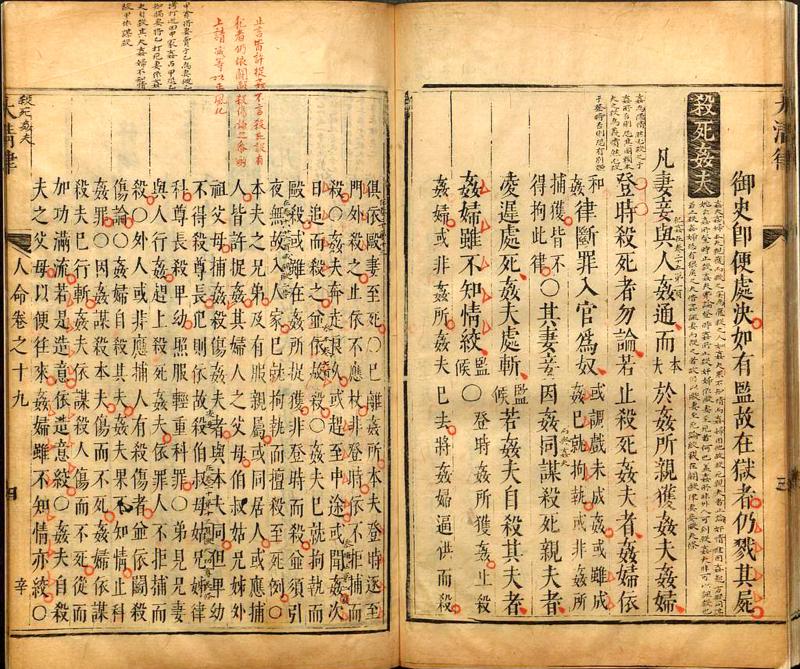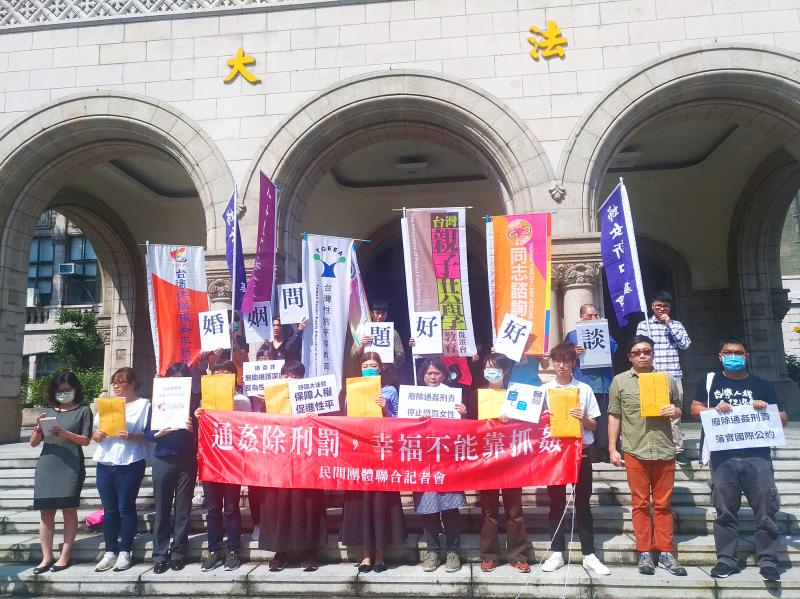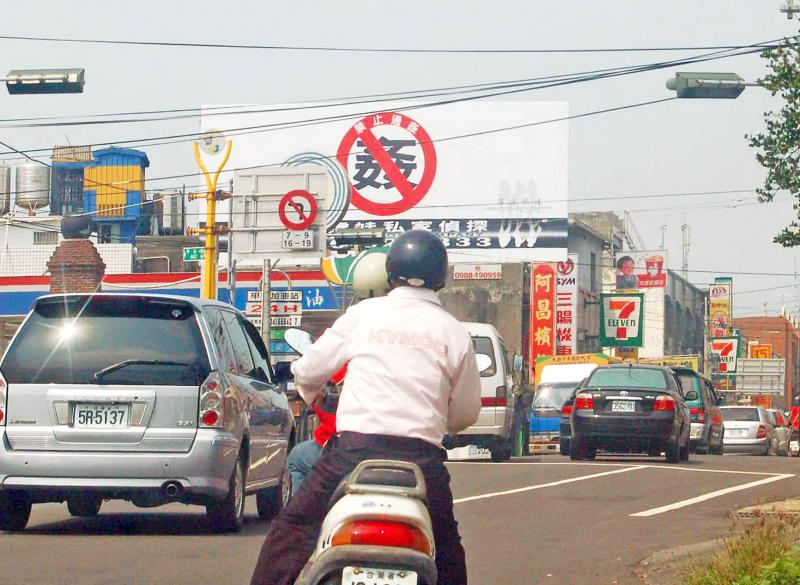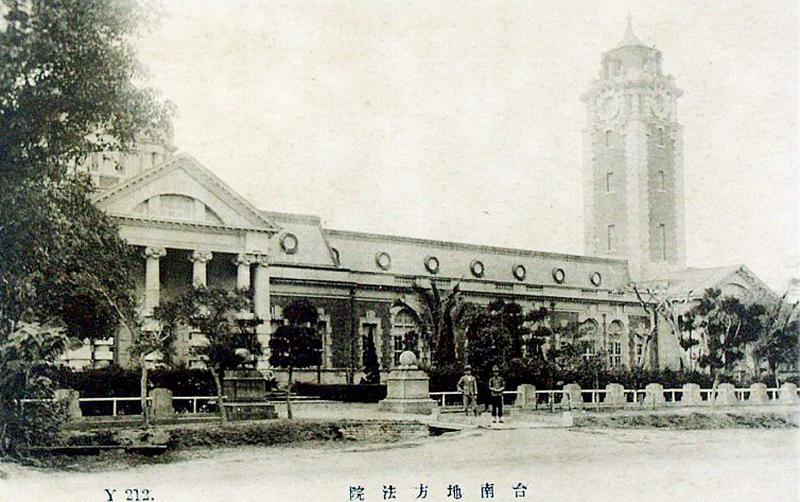April 13 to April 19
In 1773, a Changhua man named Liao Chen-sheng (廖陳生) walked in on his older brother having sex with his wife. He killed both of them with a sickle, beheaded them and took the heads to the authorities.
Killing one’s older brother normally entailed a punishment of death by a thousand cuts, but the law back then granted clemency for husbands who catch their wife cheating — provided that he committed the murder on the spot.

Photo courtesy of US Library of Congress
Taiwan under the Qing Empire had quite comprehensive laws regarding adultery. The general punishment was 90 lashes for both the man and woman, but people who found it too shameful or tedious to go to court would settle the matter privately — often in much more brutal ways. In addition, the husband had the right to divorce or sell the cheating wife.
Over 200 years later, adultery is still a punishable offense in Taiwan. People have been calling for its decriminalization since the early 1990s, and after deeming the law constitutional in 2002, the Council of Grand Justices is expected to make another interpretation next month.
BRUTAL PUNISHMENTS

Photo: Wu Cheng-feng, Taipei Times
Not everyone who killed his wife’s lover during the Qing Dynasty got off as easily as Liao. Japanese anthropologist Kanori Ino mentions this provision in a compendium of Taiwanese customs published in 1901 — although his account included a test.
First of all, the husband would have to get the heads of the wife and lover into the court — either by asking a vendor to smuggle it through the gates in their basket, or by bribing a guard. The two heads would be thrown in a bucket full of water, and if they ended up facing each other, that was proof of the affair. The husband would be rewarded with money for stopping an immoral act, but would also be caned for the murder. If they two heads did not face each other, it would indicate that the victims were innocent, and the husband would face the death penalty.
Due to the frivolousness of this test and a general lack of confidence in the court, more often than not people chose to settle the matter privately, Liu Chi-ying (劉季穎) writes in Research on Adultery Cases in Taiwan During the Qing Dynasty (清代臺灣婦女通姦案件之探究).

Photo: Tsai Chih-ming, Taipei Times
The punishments were often much more brutal than court-ordered ones — Kataoka Iwao’s record on Taiwanese folk customs states that the lightest punishment entailed either shaving the adulterer’s head, cutting his ear off, branding him or forcing him to consume feces. At worst, he would be tied to a rock and thrown into the water, or be half-buried in the ground so that passersby could kick him or spit at him. The same methods were also used on rapists, Iwao writes. Ino also lists sticking a firecracker up the offender’s rectum and setting it off, or gouging his eyes out and parading him through the streets on horseback.
In some cases, the adulterer could atone for his actions by treating the accuser’s family to alcohol or betel nuts, or host an opera performance for villagers to watch. The adulterer could also be asked to donate articles for worship to Buddhist temples with his name written on them, so whoever visited the temple would know what he did.
Another interesting part of Qing law was that the punishment entailed 10 more lashes to each party if the adulterer used trickery or incentives to get the woman to sleep with him as opposed to it happening “naturally.” If the adultery resulted in a child, it was the lover’s responsibility to raise it.

Photo courtesy of Wikimedia Commons
FROM JAPAN TO THE KMT
The Japanese applied their Western-style criminal code to Taiwan when they arrived in 1895. This was updated in 1908 and used for the rest of their rule. Per the new code, the adulterous pair would both be sentenced to under two years imprisonment. The Qing code mandated that only the husband or his relatives could be the accuser; the Japanese law was even stricter as only the husband could press charges. The wife had no such right if her husband slept with others.
The husband also had to report the crime within six months of it happening, and was required to accuse both the wife and her lover. In 1914, Ho A-pao (何阿匏) of Keelung caught his wife cheating and took her lover to court — but the judge mandated that he had to press charges against his wife too. Ho reportedly thought about it for a long time and decided to drop the case since he didn’t want his wife to go to jail.
Unlike Qing law, the Japanese forbid the husband to sell the cheating wife, but since the custom was still prevalent in those days, many people still chose to settle their matters privately.
The newspapers would comment on the prevalence of adultery cases in Taiwan — a 1905 Taiwan Daily News (台灣日日新報) editorial expressed outrage at six cases within two days in Chiayi; another one in 1911 commented on the increasing number of people incarcerated for adultery. A total of 5,703 people were officially charged for the crime between 1909 and 1942; countless more incidents were settled privately.
The 1920s is commonly seen as a period of “awakening” for Taiwanese women, as more began entering the workforce and participating in public affairs. Attitudes toward marriage and education also changed, and in 1927 an amendment to the criminal code was drafted so that women could also charge their husbands with adultery. It was still far from equal, as the case was only valid if the husband abandoned the wife or treated her badly due to his relationship with another woman.
Japan decriminalized adultery in 1947, but by then Taiwan was under Chinese Nationalist Party (KMT) rule. Before 1935, the Republic of China criminal code that the KMT used only punished female adulterers — but by the time they took charge of Taiwan, the law had been changed to treat men and women offenders equally.
This law would persist until present day, making Taiwan one of the few countries in the world that still criminalizes adultery.
Taiwan in Time, a column about Taiwan’s history that is published every Sunday, spotlights important or interesting events around the nation that have anniversaries this week.

As Taiwan’s second most populous city, Taichung looms large in the electoral map. Taiwanese political commentators describe it — along with neighboring Changhua County — as Taiwan’s “swing states” (搖擺州), which is a curious direct borrowing from American election terminology. In the early post-Martial Law era, Taichung was referred to as a “desert of democracy” because while the Democratic Progressive Party (DPP) was winning elections in the north and south, Taichung remained staunchly loyal to the Chinese Nationalist Party (KMT). That changed over time, but in both Changhua and Taichung, the DPP still suffers from a “one-term curse,” with the

William Liu (劉家君) moved to Kaohsiung from Nantou to live with his boyfriend Reg Hong (洪嘉佑). “In Nantou, people do not support gay rights at all and never even talk about it. Living here made me optimistic and made me realize how much I can express myself,” Liu tells the Taipei Times. Hong and his friend Cony Hsieh (謝昀希) are both active in several LGBT groups and organizations in Kaohsiung. They were among the people behind the city’s 16th Pride event in November last year, which gathered over 35,000 people. Along with others, they clearly see Kaohsiung as the nexus of LGBT rights.

Jan. 26 to Feb. 1 Nearly 90 years after it was last recorded, the Basay language was taught in a classroom for the first time in September last year. Over the following three months, students learned its sounds along with the customs and folktales of the Ketagalan people, who once spoke it across northern Taiwan. Although each Ketagalan settlement had its own language, Basay functioned as a common trade language. By the late 19th century, it had largely fallen out of daily use as speakers shifted to Hoklo (commonly known as Taiwanese), surviving only in fragments remembered by the elderly. In

Dissident artist Ai Weiwei’s (艾未未) famous return to the People’s Republic of China (PRC) has been overshadowed by the astonishing news of the latest arrests of senior military figures for “corruption,” but it is an interesting piece of news in its own right, though more for what Ai does not understand than for what he does. Ai simply lacks the reflective understanding that the loneliness and isolation he imagines are “European” are simply the joys of life as an expat. That goes both ways: “I love Taiwan!” say many still wet-behind-the-ears expats here, not realizing what they love is being an